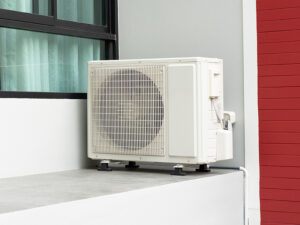Reasons Why Your Outside AC Unit Is Making Loud Noise
 Modern air conditioners are quieter than older models. Some models feature sound-dampening technology but we can attribute their lower noise levels to technological advancements and better parts.
Modern air conditioners are quieter than older models. Some models feature sound-dampening technology but we can attribute their lower noise levels to technological advancements and better parts.
For that reason, you should be concerned if your outside AC unit is making a loud noise. In most cases, the noise signifies a malfunction that requires immediate attention.
Regular AC maintenance is a major part of HVAC services in Cherry Hill by Davis Home Services. Our approach helps keep your outside AC unit from making loud noise. So, if you’ve had your AC unit for a while without a maintenance check, you may notice parts wearing out and making loud noises.
This article will look at the different types of AC noise, the common causes, and possible solutions.
Screeching Noise
If your outside AC unit sounds like pieces of metal grinding together, two reasons for the noise could be:
- Problems with the condenser fan motor. Most outdoor units have an interior fan. If the fan motor has damage, you’re likely to hear loud screeching when running your unit.
- Damaged compressor. Your AC’s compressor circulates the refrigerant as your unit operates. If the compressor has damage or starts to fail, you may hear that loud screeching sound anytime you use the AC.
We recommend having a professional fix these parts or replace them if they have extensive damage.
Banging Noise
If you hear a loud slamming or banging noise from your outdoor AC unit, it may have one of the following problems:
- Worn-out compressor support springs. Your compressor support springs provide the necessary balance for your compressor. However, as they wear out, the compressor will lose balance and hit nearby parts while in use, causing the banging sounds you hear.
- Loose condenser fan. If your condenser fan has loose parts, these parts will hit other parts of your outdoor unit. This interference then creates those loud banging sounds.
We can fix these problems by repairing any misaligned parts or replacing them if necessary.
Popping Noise
A popping noise like you’d get when making popcorn indicates another significant AC problem you shouldn’t ignore. You should turn off the air conditioning unit once you notice this problem. The noise reflects a malfunctioning compressor, which can lead to expensive damage if left unaddressed.
The popping noise happens when the compressor absorbs a refrigerant’s liquid form instead of its vapor form. Ignoring the problem will damage the compressor over time. So, turning off the unit and calling a professional can save you considerable money.
Buzzing Noise
A loud buzzing noise from your outdoor unit is a common sign of an electrical issue. Some of these electrical problems include:
- Faulty compressor or condenser fan
- Damaged capacitor
- Frayed or loose wiring
Calling a professional to identify the cause of the problem is the best way to repair your AC and eliminate the buzzing noise.
Hissing Noise
A refrigerant leak is the most common reason for a hissing noise. The refrigerant is the liquid/gas that cools the air when your air conditioning unit works properly. The refrigerant circulates inside closed-loop copper lines, so it shouldn’t run out of it unless the loop has a leak.
The hissing noise shows the refrigerant is escaping into the air. If the leak continues for long enough, you’ll experience reduced efficacy from your air conditioning unit. Other common signs of a refrigerant leak include:
- Higher than normal energy bills
- Warmer air entering your home, even while the unit is in use
- Visible ice on the refrigerant lines
- A chemical odor near the refrigerant lines
To correct a loud outside AC unit, we need to find the source of the leak. Then, we need to fix the issue and restore the refrigerant levels.
Grinding Noise
A grinding noise from your outdoor AC unit is almost always a compressor or motor problem. Specifically, the pistons in a defective compressor give off a heavy grinding noise as the unit operates. In this scenario, it’s best to replace the entire compressor instead of repairing individual parts.
On the other hand, motor problems are easier to handle as oiling the unit often stops the noise.
Rattling Noise
A rattling noise in your outdoor unit usually points to loose screws in any of the moving parts. The compressor fan is often the main culprit in this situation. However, the unit’s vibration can loosen screws in other parts while in use.
We address this issue by checking your unit for loose screws and tightening them with a screwdriver.
Don’t Ignore Any Noise from Your Outside AC Unit
If you notice any unusual noise from your outside AC unit, act quickly. Ignoring unusual noises can turn minor issues into problems that will require costly repairs or total replacement of your AC unit. Such issues can also lower the longevity of your air conditioning unit.
You should also note that noises coming from your outdoor unit could indicate more than mechanical problems. Some reasons for an outside AC unit’s loud noise can pose risks to your health. For example, a refrigerant leak can lead to you or a loved one experiencing refrigerant poisoning.
Also, any problems that stop the unit from working efficiently may cause poorer indoor air quality. Specifically, a faulty unit can spread allergens and pollutants around your home. For that reason, it’s in your best interest to have a professional check out any loud noise as soon as possible.
Professional AC Maintenance from Davis Home Services
At Davis Home Services, we offer regular maintenance and professional inspections for AC units. We recommend getting your air conditioning unit inspected twice a year.
Our qualified technicians know where to look to ensure your unit is working as it should. Therefore, we help prevent your outside AC unit from making loud noise while in use. You can read more about air conditioning services or call us at 844-226-9872 to discuss a maintenance appointment.

